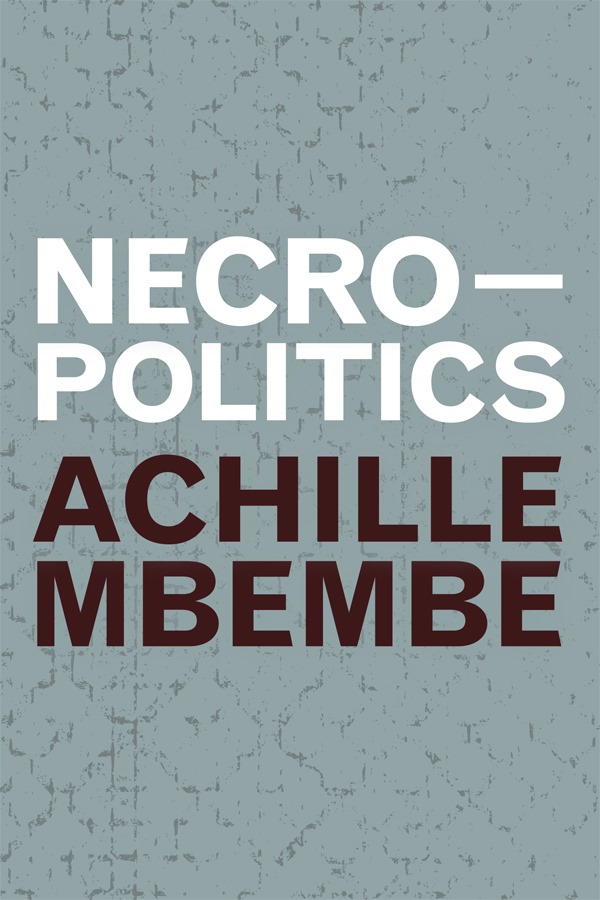Achille Mbembe’s Necropolitics
In Necropolitics Achille Mbembe, a leader in the new wave of francophone critical theory, theorizes the genealogy of the contemporary world, a world plagued by ever-increasing inequality, militarization, enmity, and terror as well as by a resurgence of racist, fascist, and nationalist forces determined to exclude and kill.

He outlines how democracy has begun to embrace its dark side—what he calls its “nocturnal body”—which is based on the desires, fears, affects, relations, and violence that drove colonialism. This shift has hollowed out democracy, thereby eroding the very values, rights, and freedoms liberal democracy routinely celebrates. As a result, war has become the sacrament of our times in a conception of sovereignty that operates by annihilating all those considered enemies of the state. Despite his dire diagnosis, Mbembe draws on post-Foucauldian debates on biopolitics, war, and race as well as Fanon’s notion of care as a shared vulnerability to explore how new conceptions of the human that transcend humanism might come to pass. These new conceptions would allow us to encounter the Other not as a thing to exclude but as a person with whom to build a more just world.
“Mbembe refreshes the debate in a Europe consumed by the ‘desire of apartheid.’ This is a man who is not afraid to throw national history, identities, and borders out the window. French universalism? ‘Conceited,’ asserts Mbembe. . . . In the style of Edouard Glissant . . . he doesn’t limit his geography to the level of the nation but expands it to the ‘Whole-World.’ He dreams of writing a common history of humanity that would deflate all the flashy national heroism and redraw new relations between the self and the other. In a France and a Europe which are even afraid of their own shadows, one can clearly see the subversive potential of Mbembe’s thought. His latest book Necropolitics, draws the unpleasant portrait of a continent eaten up by the desire of ‘apartheid,’ moved by the obsessive search for an enemy, and with war as its favorite game.” — Cécile Daumas, Libération
“[Mbembe’s] new book . . . is a precious tool to understand what occurs in the North as well as in the South. The analyses of this faithful reader of Franz Fanon are irrevocable: war has become not an exception but a permanent state, ‘the sacrament of our era’. . . . One of the biggest challenges we have to face, Mbembe warns us, is to defend our democracies while including this ‘other’ whom we don’t want if we are to build our common future.” — Séverine Kodjo-Grandvaux and Michael Pauron, Jeune Afrique
“The appearance of Achille Mbembe’s Necropolitics will change the terms of debate within the English-speaking world. Trenchant in his critique of racism and its relation to the precepts of liberal democracy, Mbembe continues where Foucault left off, tracking the lethal afterlife of sovereign power as it subjects whole populations to what Fanon called ‘the zone of non-being.’ Mbembe not only engages with biopolitics, the politics of enmity, and the state of exception; he also opens up the possibility of a global ethic, one that relies less on sovereign power than on the transnational resistance to the spread of the death-world.” — Judith Butler
“This book establishes Achille Mbembe as the leading humanistic voice in the study of sovereignty, democracy, migration, and war in the contemporary world. Mbembe accomplishes the nearly impossible task of finding a radical path through the darkness of our times and seizes hope from the jaws of what he calls ‘the deadlocks of humanism.’ It is not a comforting book to read, but it is an impossible book to put down.” — Arjun Appadurai
“[Mbembe’s] latest and eminently readable offering . . . speaks to the spirit of our times with such clarity and profundity that it bears all the hallmarks of an instant classic of anti-racist literature.” — Ashish Ghadiali, Red Pepper
“[Necropolitics] is a book that is in places rather complex to read but it is de?nitely worth persevering with, since it is ?lled with interesting insights into such issues as racism, the role of borders and separation, terrorism and its political expression and the mundane and everyday forms of enmity and hatred that shape the contemporary world around us.” — John Solomos, Ethnic and Racial Studies
“Hardly a single longform essay, Necropolitics is a portal of intricate thoughts on the state of the planet. … Mbembe’s latest work is a signi?cant contribution to political and critical theory. Necropolitics is the book of this sti?ing hour, Mbembe its chronicler.” — Eric Otieno, Postcolonial Studies
Achille Mbembe, Necro-politics. DDuke University Press. Pages: 224.
Published: October 2019
